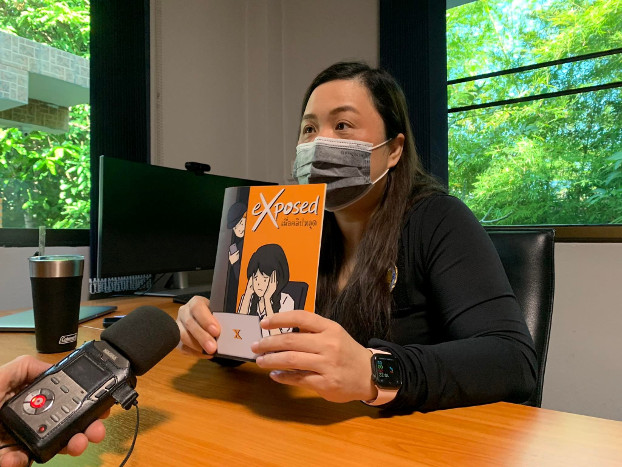Thai police link pandemic to increased online child sex-abuse cases
2022.03.24
Bangkok
 Child protection police officers raid the apartment of a suspect in Thailand who allegedly filmed private videos of children and women, in this undated photo that was released with the suspect’s face blurred.
Child protection police officers raid the apartment of a suspect in Thailand who allegedly filmed private videos of children and women, in this undated photo that was released with the suspect’s face blurred.
Thai police arrested 86 suspects on child-sex abuse charges in the first two months of 2022, with police and protection agencies noting that changes in technology use had led to such cases more than doubling since the coronavirus pandemic began.
A police task force last year arrested 73 suspects for alleged crimes, including sexual harassment, possessing child porn materials, trafficking in persons and extortion, said Police Maj. Gen. Wiwat Khamchamnan, chief of the Anti-Trafficking in Persons Division (ATPD). The task force provided support to at least 49 victims – boys and girls, all younger than 18 – he said.
“Technology crimes, including online child sexual exploitation, doubled in 2021 compared to pre-pandemic period,” Wiwat told BenarNews, noting about 30 cases were investigated in 2019.
The task force recorded 152 online child sexual abuse cases between June 2015 and September 2020.
“Physical crimes have transformed into cybercrimes. People don’t even need to visit the dark web to find child sexual materials. It’s everywhere on social media these days,” Wiwat said.
The dark web refers to internet content accessible only by using specific software, configurations or authorization. It has been used for criminal activities because it provides maximum anonymity.
Exploitation of children
An estimated 400,000 children in Thailand were subjected to exploitation last year alone, according to “Disrupting Harm,” a report funded by the Global Partnership to End Violence against Children initiative and supported by UNICEF, Interpol and ECPAT, a network of global civil society organizations that works to end online sexual exploitation of children.
The report found that 9 percent of internet-using Thai children between the ages of 12 and 17 were victims of grave instances of online sexual exploitation and abuse.
“This includes being blackmailed to engage in sexual activities, someone else sharing their sexual images without permission, or being coerced to engage in sexual activities through promises of money or gifts,” said the report released last month.
Twenty-nine percent of the children surveyed said they saw sexual content online by accident, in a pop-up advertisement or social media post, according to the report. Abused children were primarily targeted on social media platforms, specifically Facebook, Twitter, Instagram and TikTok, followed by online games and in-person interactions.
Authorities and child protection activists said many children are vulnerable because they spend more time online with minimal supervision since the COVID-19 pandemic forced them to stay home.
In most cases, the report said, the boy or girl knew the person who initiated exploitation or abuse, which meant it could be someone close to the child or the child’s network. Few of those affected reached out to police, social workers or helplines.
Since 2018, cooperation among Thai police, Interpol, Australian and U.S. authorities has led to arrests of at least three Thai operators of child sex abuse websites with a total subscriber base of more than 65,000 worldwide.
Last year, Thai police arrested a 28-year-old man who claimed to work as an agent for child models, and seized more than 500,000 photographs of child sex abuse – the largest-ever cache. The suspect faces charges of uploading obscene materials, attempted rape of a minor/rape of a minor and child molestation.
Wiwat estimated the value of the child-exploitation-porn industry at about 500 million baht (U.S. $14.9 million) a year, based on transactions under investigation.
“Online makes it easier for people to trade sex and sexual-related materials,” Wiwat said.

Rising trend
A child rights activist said her NGO last year had assisted nearly 100 children abused by sexual predators.
“The cases double every year, and I see the same trend in 2022,” said Weerawan Mosby, founder and director of HUG Project, an NGO that works to protect Thai children from sexual abuse and online sex trafficking.
“I said it is increasing because there are so many unregulated websites and there is no one to protect the children,” Weerawan said. “It’s easy to register a domain [website] name and find a server, and not comply with the laws.”
Weerawan said while many children have reached out to her and other activists her during the pandemic, some are trying to make money by “selling themselves online.”
“We have our concerns regarding live-streaming. Children like going online and thinking this is the easiest way to make money, so they advertise as a call girl,” Weerawan said.
Wiwat has similar concerns.
“Due to the pandemic economic ripple effects, many kids under 18 advertise themselves to make money,” he said. “And then they preyed on other children too. There became brokers, using money to bait other kids and sell them on bigger platforms.”
Weerawan said collective efforts are needed to end such illicit activities.
Her group has created a survival kit for children and is working with police, prosecutors, and judges to establish guidelines on how to report such cases, not only to the police but also on platforms such as Facebook and Twitter.
“We see children are afraid to report the case to the police because they don’t know what the judicial system is like,” Weerawan said. “They may go to a local police station, but the non-specialist police may not know how to investigate such a case and may inadvertently tell children to find the offenders themselves.
“If more arrests are made, and even more serious is taken, the trend could ease,” she said.
Subel Rai Bhandari in Bangkok contributed to this report.







